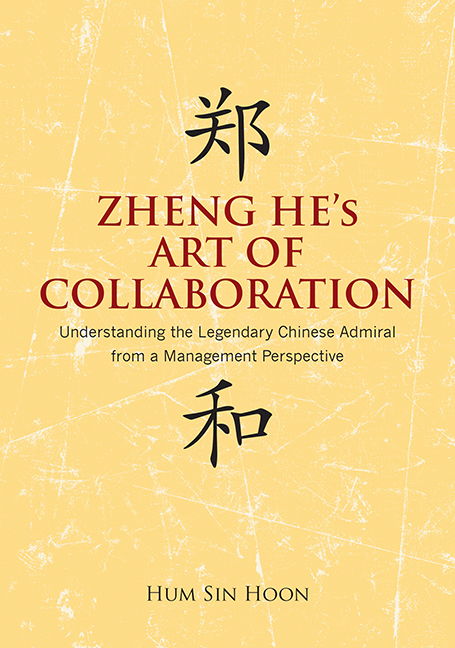 Zheng He's Art of Collaboration
Zheng He's Art of Collaboration Published online by Cambridge University Press: 21 October 2015
What should be the relevant management philosophy and strategies for today's twenty-first century world?
Currently, one of the most popular management concepts is that based on “Sun Zi Bing Fa” or “Sun Zi's Art of War”. Sun Zi was a brilliant Chinese military strategist and he developed his war strategies some 2,600 years ago (in the sixth century BC). Many books have since been written about his war strategies and how they can be effectively applied to modern business. Indeed, many business empires have been built based on the philosophy of Sun Zi's Art of War.
Under this doctrine, “business is a battlefield” where winners take all. It is either “kill or be killed” and usually, only the strongest prevail. It underlines the belief that “Big Fish Eat Small Fish and Small Fish Eat Shrimp”. In short, it is either you eat or gobble up your opponent or you yourself will be eaten up.
While this management concept holds true for many people and for a very long period of time, recent events have shown otherwise. With the advent of the Internet, and after 911, and the current prevalence of mobile technologies and devices, the world has changed.
911 demonstrated that “shrimps” also have the abilities to fight back quite effectively. Computer hackers working alone in their bedrooms have caused havoc to the world's computer systems.Suicide bombers are other examples of “shrimps” fighting back. The collective strength of the common people is being confirmed even in the most current uprising in the Middle East.
Today's technologies have transformed and created a huge paradigm shift in business strategies. With “business knowledge” and “information” easily available to all, should we still continue to adopt and practise “Sun Zi Bing Fa” or Sun Zi's Art of War which was developed some 2,600 years ago before the computer, Internet and today's wireless technologies?
My personal view is that we should review our dependence on “Sun Zi Bing Fa”. But do we have any alternative? Again we can turn to history to give us an answer. More than 600 years ago, Zheng He made seven famous expeditions to Asia including Malacca, India, the Middle East and even Africa. With more than 200 ships and 27,000 soldiers/sailors, his armada was the largest the world had ever seen.
To save this book to your Kindle, first ensure no-reply@cambridge.org is added to your Approved Personal Document E-mail List under your Personal Document Settings on the Manage Your Content and Devices page of your Amazon account. Then enter the ‘name’ part of your Kindle email address below. Find out more about saving to your Kindle.
Note you can select to save to either the @free.kindle.com or @kindle.com variations. ‘@free.kindle.com’ emails are free but can only be saved to your device when it is connected to wi-fi. ‘@kindle.com’ emails can be delivered even when you are not connected to wi-fi, but note that service fees apply.
Find out more about the Kindle Personal Document Service.
To save content items to your account, please confirm that you agree to abide by our usage policies. If this is the first time you use this feature, you will be asked to authorise Cambridge Core to connect with your account. Find out more about saving content to Dropbox.
To save content items to your account, please confirm that you agree to abide by our usage policies. If this is the first time you use this feature, you will be asked to authorise Cambridge Core to connect with your account. Find out more about saving content to Google Drive.